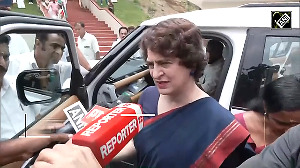The next time you fail to reach office on time, stop cursing the 'rubberneckers' for causing the traffic jams.
Many traffic jams leave drivers baffled as they reach the end of a tail-back to find no visible cause for their delay.
Mathematicians from the University of Exeter have now developed a model to reason major delays occurring on the roads, with no apparent cause.
The mathematical model showed the impact of unexpected events such as a lorry pulling out of its lane on a divided highway with median between traffic going in opposite directions.
It revealed that slowing down below a critical speed when reacting to such an event, a driver would force the car behind to slow down and the next car back to reduce its speed further. The result would be that a maze of cars would finally grind to a halt, with drivers oblivious to the reason for their delay.
The jam moves backwards through the traffic creating a so-called 'backward travelling wave', which drivers may encounter many miles upstream, several minutes after it was triggered.
The model shows that overreaction of a single driver can have an enormous impact on the rest of the traffic, leading to massive delays, Science daily quoted Gabor Orosz of the University of Exeter as saying.
Drivers and policy-makers had not previously known why jams like these occurred, though many blamed it to the sheer volume of traffic.
The model claimed that heavy traffic would not automatically lead to congestion but could be smooth-flowing. The model took into account the time-delay in drivers' reactions, which led to drivers braking more heavily than would have been necessary had they identified and reacted to a problem ahead a second earlier.
The research team now plans to develop a model for cars equipped with new electronic devices, which could cut down on over-braking as a result of slow reactions.






 © 2025
© 2025